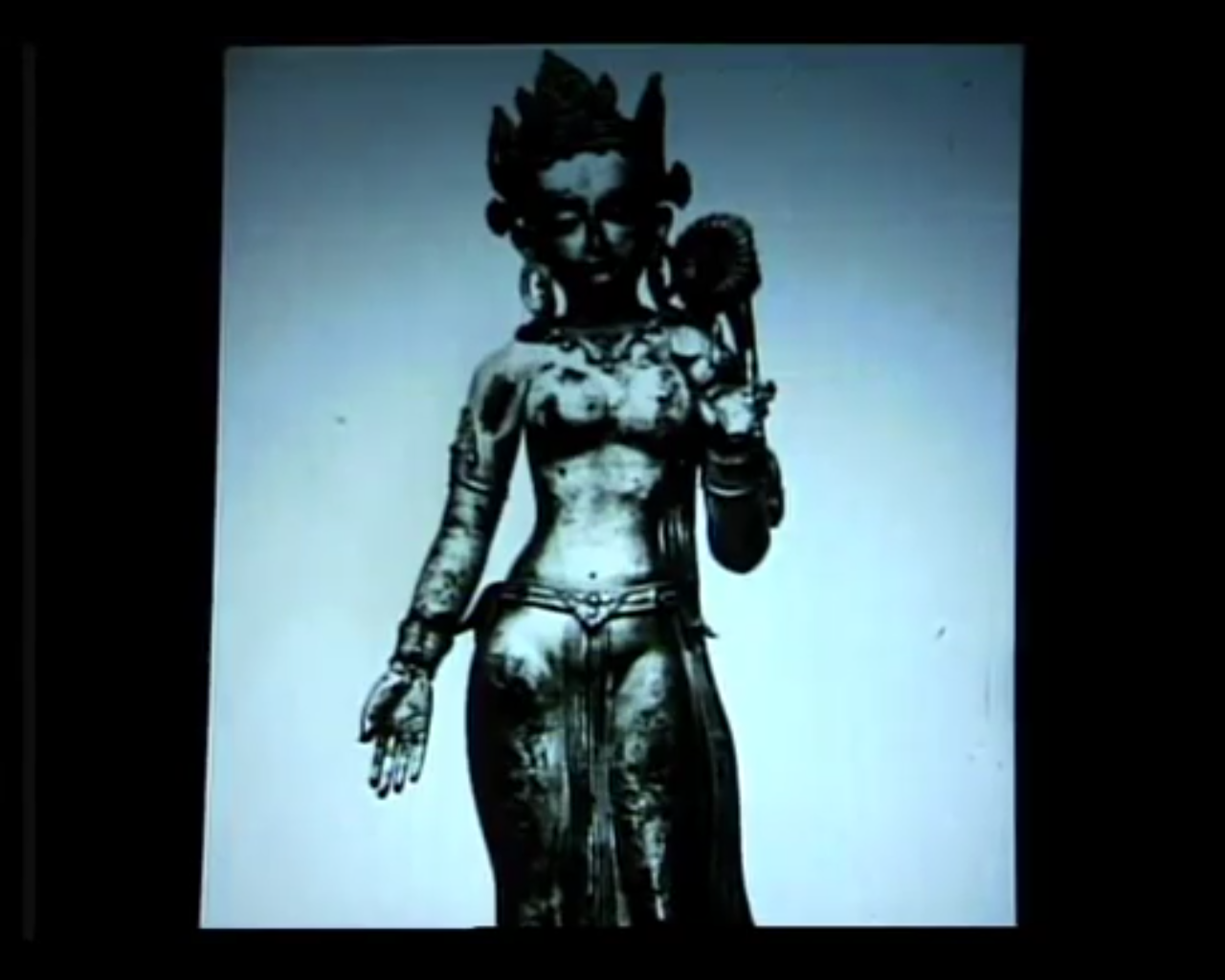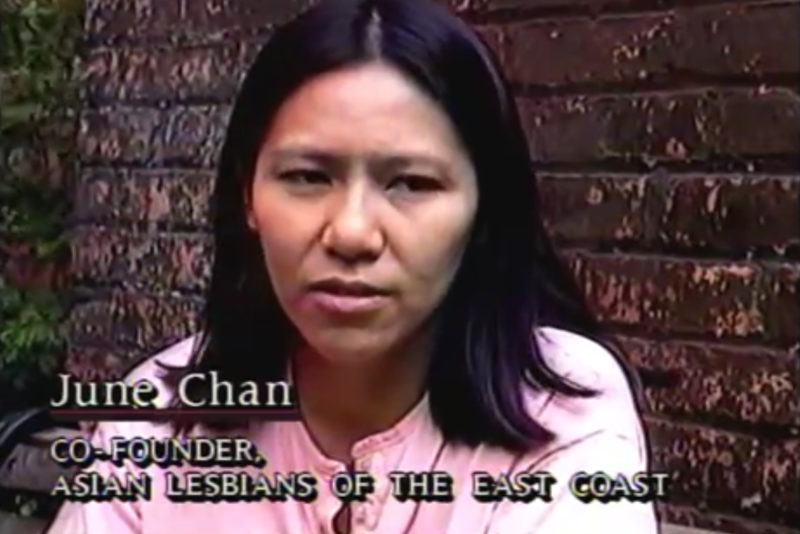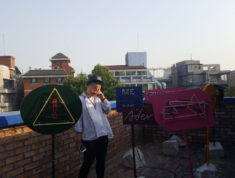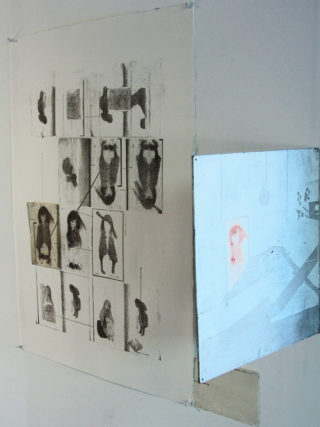As one of the Center for the Humanities’ newest Digital Public Fellows, I was asked to introduce my work and the stakes it holds. Briefly, my work is immersed in archives and archival practices, oral histories and stories (for more information, visit my project page "Meandering through the Not Yet Found: Recuperating Life Histories of Queer Asians in the U.S."). As such, I pondered how I might begin to introduce my project as well as the larger collective work that is being done at the Center, which not only delves deeply into archives but also pushes on their boundaries. I decided to take this opportunity to lay out my motivations for the project as a way to “archive” the beginnings of what I hope to be a meaningful two-year endeavor.
Partially conceived as a history project for a first year requirement in the Critical Social/Personality Psychology program, the current project began with the idea of wanting to produce something that centers the lives of queer Asian (American)s. Originally, my intentions were to question the coming out framework and its limitations as it (fails to) apply to queer Asian (American)s, but it was at this moment that I realized just how little I knew of their histories. Taking a step back, I began to question if I could talk about the limitations of the coming out framework if I was not firstly familiar with queer Asian (American) histories and legacies. Following this moment of hesitation was the awareness that histories of/on queer identities rarely intersect with an Asian identity (in my case, a Chinese identity), and almost all normative understandings of queer activism and history have been painted over by whiteness. Refusing to subscribe to narratives that do not include queer Asian (American)s, I began my search for their histories and stories.
Limited to my knowledge and experience, I stuck to what I knew of psychology and searched desperately within journals and literature of the discipline to no real results. Expanding my search into other related disciplines (LGBT/Sexuality Studies, Gender Studies, Asian American Studies…), continued to yield little. Stories, narratives, and lives that did appear often centered around those who identified as cisgender and gay men, thereby further obscuring the lives of those who are not (e.g. women, trans and gender non-conforming). Despite their absences in the literature, I knew that queer Asian (American)s had to have existed before me. Frustrated, this eventually led to my clumsy and somewhat desperate foray into archives. Having had no formal understanding of and methodological knowledge of what it means to do “archival work,” I bumbled my way through a series of meandering connections that led me to the organization Asian Lesbians of the East Coast (ALOEC) and their co-founder June Chan. This opportunity to explore the archive of ALOEC (housed in the Lesbian Herstory Archive) and to speak with June, while exciting and meaningful, only further fueled my question of, where are the Asians? ALOEC’s almost 10 years of activism work resides in one tiny folder in a metal filing cabinet on the second floor of the archive; if this was what became of a group that had been active for 10 years, I can only wonder what became of those lives and legacies that we may never hear about as they were forgotten / erased / marginalized / lost, particularly of those who are trans and gender non-conforming.

"The lesbian and gay community is much more broader than what began with Sappho." -- June Chan (from Not Just Passing Through). This image is taken from a slideshow reel that June produced as a way to mark an Asian lesbian history that existed before her. Sadly, the slideshow reel is lost to time, and the documentation of it exists only in the documentary.
Somewhat serendipitously, my desire to continue working on documenting / recording / uncovering the histories, narratives, and stories of those that came before me was fulfilled through the Center for the Humanities’ call for a Digital Public Fellow through the Seminar on Public Engagement and Collaborative Research. It was especially appealing to me that the Center was also pushing on possible meanings and practices of archival work, thereby making it an ideal space for me to not only delve deeper into various archives but also to question the methodological conventions that might have restricted and bounded normative practices of this work. While I was already prepared to queer my archival practices, the Seminar’s Spring 2017 meetings further convinced me that the digital archive space I had hoped to create has to be done so collectively. I do not want to subscribe to the conventions of being the singular archivist that documents and records the histories. Simultaneously an archive and a living document, I want to ensure that this project is open and collaborative; hence, I want to invite queer Asian activists/young people to participate, especially those who are trans and gender non-conforming.
Alongside this work, and in addition to their publication series Lost & Found: The CUNY Poetics Documents Initiative, the Center is also currently providing the space for four other working groups that are exploring archives and archival practices. While these working groups, Primary Source, VHS Archives, The City Amplified, and The Labor of Care Archive, approach archives and archival practices from different perspectives, they are collectively invested in the relationship(s) between archives and their publics. Invested in recovering histories and silences, both VHS Archives (led by Alexandra Juhasz, Professor of Media Studies at Brooklyn College) and Primary Source (led by Mary Catherine Kinniburgh, English, Graduate Center, CUNY) seek to connect students, scholars, librarians and a host of different community members to think through the possibilities of working with VHS collections and primary sources respectively. Both groups endeavor to provide a space for deep engagement with existing archives to think about how they might (re)connect with the publics. Working with the nearly obsolete medium of VHS, this working group grapples with remaining archives to seek, recover, and revel in the histories and narratives uncovered. One of the ways in which the group brings these discoveries to the public is through the use of the Center’s blog. For example, group organizer Alexandra Juhasz’s conversation with writer and organizer Tedd Kerr about AIDS activist videotapes, published on the Center’s blog, provides a link between the uncovering of vital legacies and the public. Moving to a broader engagement with primary sources, the working group Primary Source partners with a variety of organizations and initiatives. Participants of this working group are encouraged to reflect on their own positions as embodied readers as they engage with a variety of primary sources. Since participating in the pilot program, several members of the group have also began to write about their experiences with and in the various archives on the Center’s blog, ranging from The Floating Bear, a poetry newsletter published by Diane di Prima and LeRoi Jones, to a self-annotated copy of Valerie Solanas’s SCUM Manifesto.
Also stemming from the Seminar Public Engagement and Collaborative Research, The City Amplified (led by Prithi Kanakamedala, Assistant Professor of History at Bronx Community College) and The Labor of Care Archive (led by Kathy McDonald, Associate Professor of English in the Department of Interdisciplinary Arts and Sciences at the City College of New York Center for Worker Education) working groups are directly concerned with the relationship between archival methodologies, oral histories and the public. Carefully engaging with the rich knowledge held by different communities and neighborhoods, The City Amplified deeply considers what radical archiving might look like in practice, what transparency and accountability mean in these collaborations, and how CUNY might situate itself within this process. Guided by these critical questions, the working group partners with collaborators and peers that fall outside the academy to push on existing conventions of archival practices. Working primarily with caregivers, The Labor of Care Archive seeks to utilize a digital archive space as a way of amplifying the narratives of caregivers in New York City and beyond. Through increasing visibility of these stories, this working group hopes to facilitate public dialogue about the politics of long-term caregiving and end-of-life care practices in the United States. Engaging at both the global and local level, The Labor of Care Archive also seeks to address the implications of this form of caring labor exchange, as a result of migrant caregivers coming to the U.S. and leaving their home countries.
With each working group plugging into archives and archival practices in such diverse ways, I am cautiously excited for the possibilities that these activities will lend to broader conversations about archival work. Always keeping the public in mind, these projects are deeply concerned about creating and / or recovering a space that will allow for forgotten / erased / marginalized / lost histories to be acknowledged and present / future narratives to live. As my project begins to take form alongside these groups, I would also like to take this opportunity to reach out to anyone who has a story to share (or knows someone who does) about queer Asian (American)s, particularly of folks who are trans or gender non-conforming. They can contact me via [email protected].



